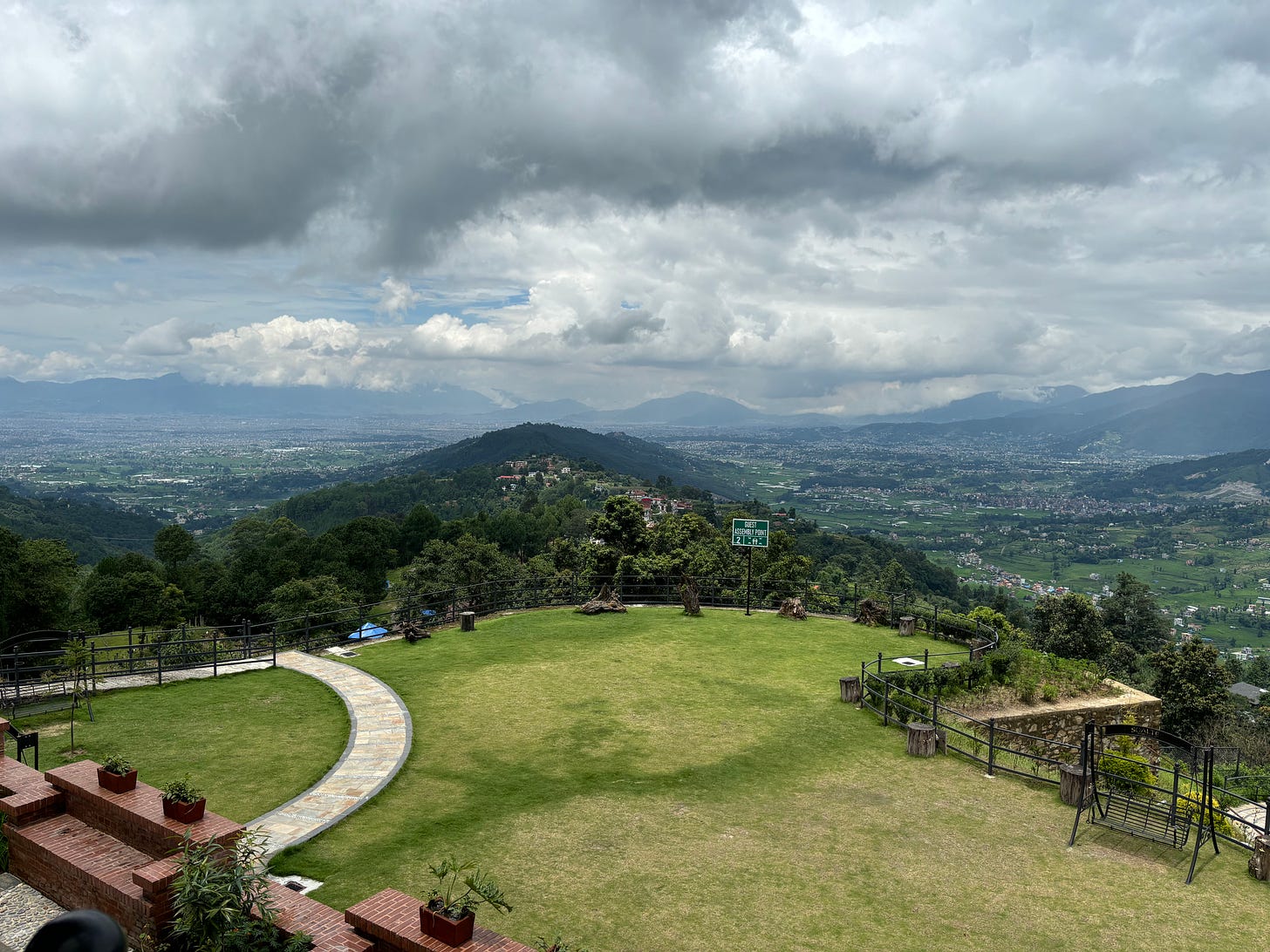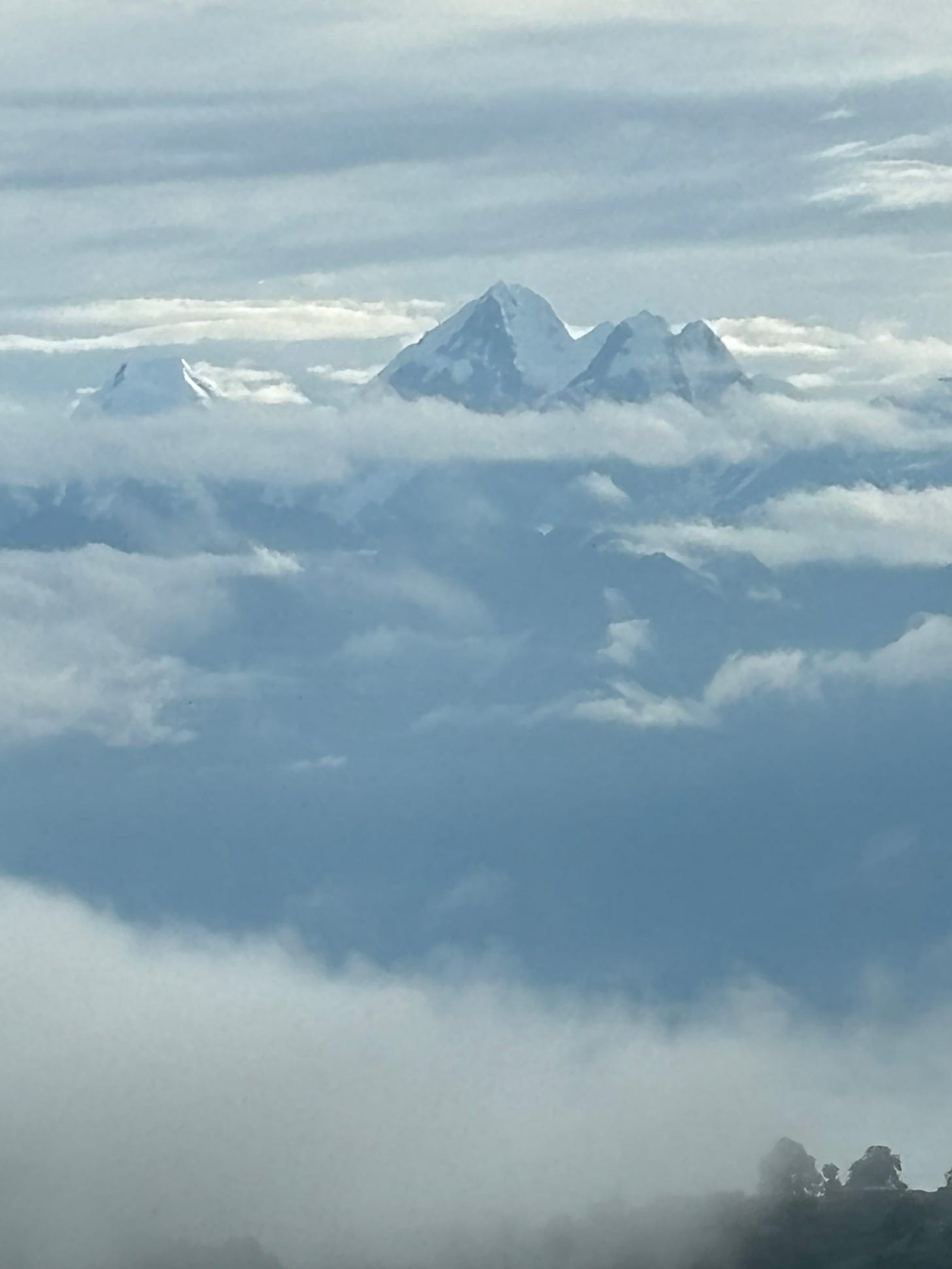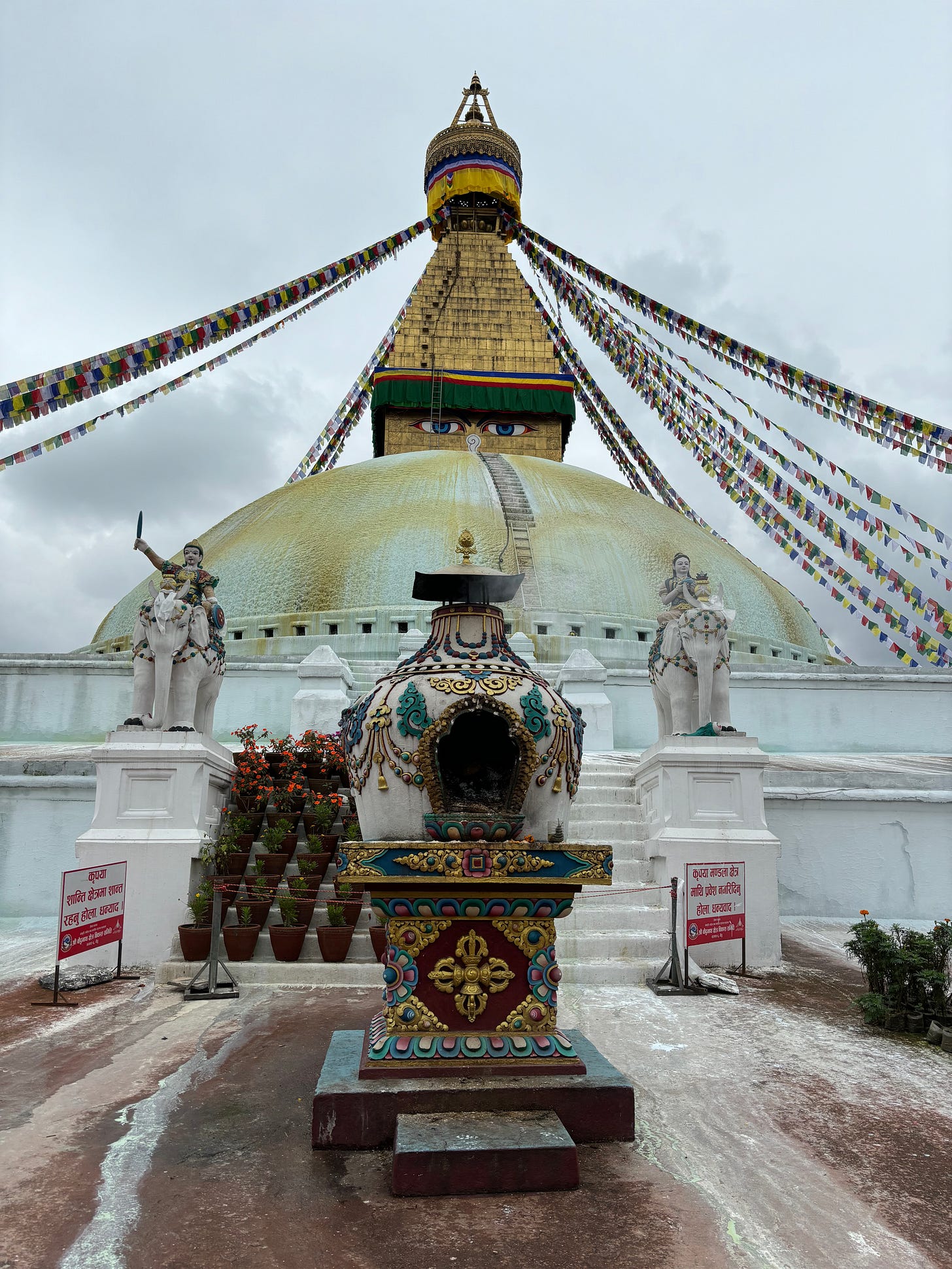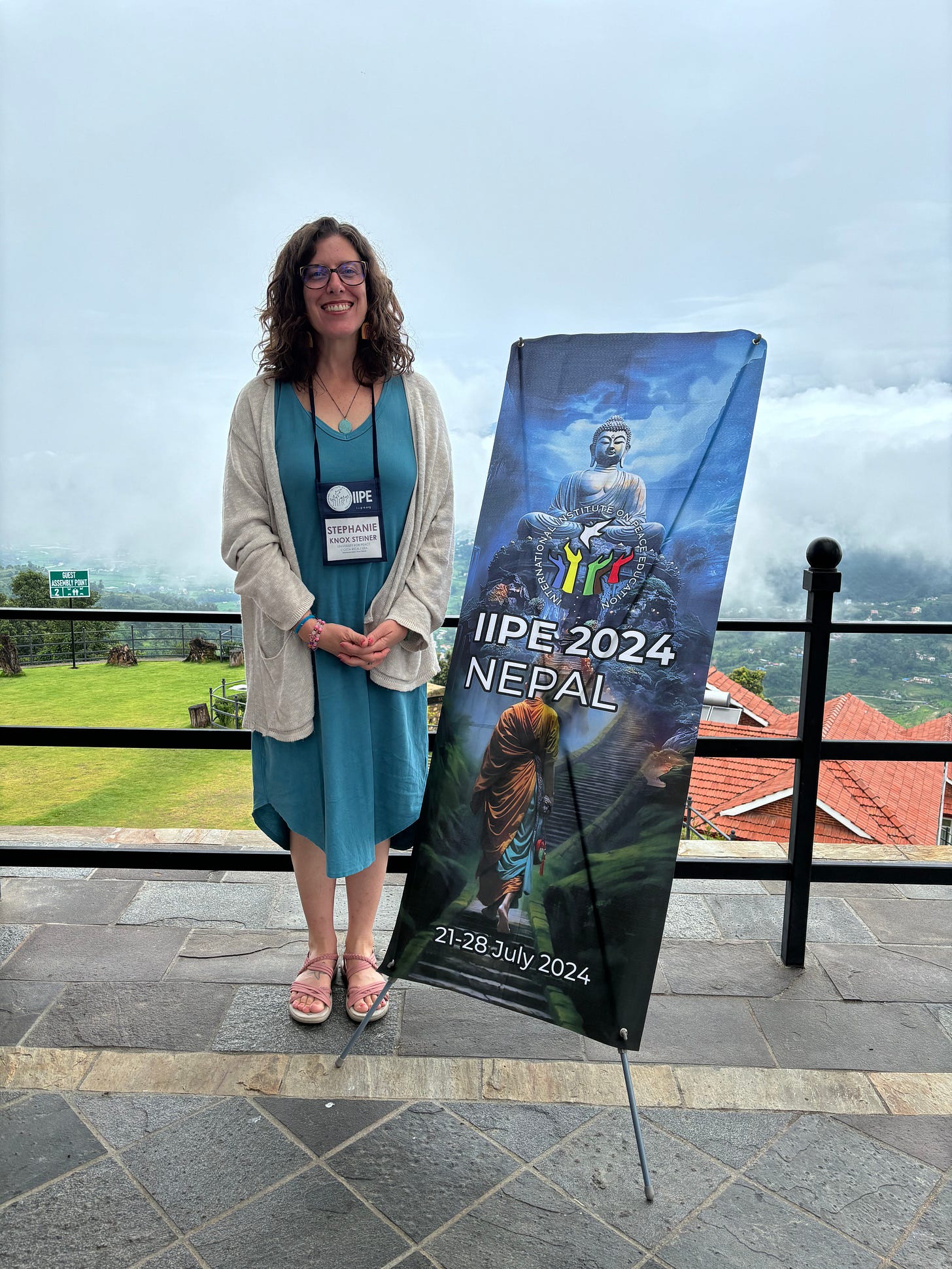Dear Enchantable ones,
As I write to you today, I am slowly coming back to life after a bout of dengue fever, which I returned with from my trip to Nepal for the International Institute on Peace Education (IIPE). When I first returned, all I could see and feel was the dengue, the part of the trip before becoming sick was overshadowed by the illness and felt very far away, foggy, like a dream. As I recover, I can now reflect and remember the moments before I got sick, and today I would like to share some of the things I am thinking about and reflecting upon, which I offer in the spirit of sharing this journey, which I was so privileged to take, with you.
As I began to reflect, I noticed an interesting theme among my reflections, all related to the Latin root hospes, which means both host and guest, and hospitum, which describes a place that gave protection and refuge. The word hospital shares the same root, and was where I ended up when I returned home from my trip. The theme of my workshop was hospicing modernity, and I have been thinking a lot about the radical hospitality we encountered in Nepal. So I invite you on this entangled journey of hospes - hosting, hospitals, hospicing, and hospitality.
I returned from the trip with my body a host for dengue. It is impossible to say whether I contracted it in Nepal or here in Costa Rica, as it is endemic to both countries and I was within the window of potential exposure for both places. In any case, I started not feeling well towards the end of my trip, which I thought at the time was just a combination of jet lag plus elevation plus menstruation plus food poisoning (which was felt like a train wreck in my body). When I awoke on the final day with a full-body rash and swelling in my hands and feet, I knew something was wrong beyond the aforementioned causes, and it seemed like some kind of allergic reaction. We called a doctor but decided I was well enough to travel. Upon returning home, blood tests at the hospital determined it was dengue.
As I come back to life, recovering my energy from being a host to dengue, I feel so grateful to be coming out on the other side. Dengue is dangerous, deadly even, and I know I am fortunate to have had a milder case and not the hemorrhagic kind. I know I am forever changed having had it. As I recuperate, I find myself struggling with knowing how to exist now that I have had it. Dengue is a mosquito-borne illness where, once you have had it, you are more likely to have a worse version the second time, and needless to say this has me worried, concerned, a little scared, trying to figure out how to relate to mosquitos in a place where they are prolific, how to live having hosted dengue in my body once already.
Coming Back to Life is the title of a favorite book, Joanna Macy and Molly Brown’s book on Joanna’s body of work, the Work that Reconnects. It’s a title I pulled out in the lead-up to my Nepal trip to help me plan the workshop I offered on hospicing modernity. The workshop is a story itself and was a highlight of the trip for me, being able to offer it and have willing and eager participants in its experimental nature. I wrote a little reflection about it for my other Substack that I tend with my friend Minna, Prism of Wisdom, which you can find here:
In the opening session of IIPE, our host Rajib Timalsina, one of the main local organizers in Nepal, began his remarks with the declaration:
“We are all dignitaries here.”
The word dignitary usually signifies someone who is important due to their rank or status - a world I awkwardly bump up against as part of the diplomatic community. Rajib was talking about how different high-ranking people, when they heard of the event, wanted to come and give remarks - and we did have an evening with Nepali public intellectuals which was a beautiful exchange and very meaningful. But the heartbeat of the IIPE is that it is a global learning community, that everyone participates and exchanges knowledge, and that we are all equals and bringing value to the group. This is embodied in the program by everyone offering something to the collective learning experience.
It is a radical disruption of hierarchies to claim that we are all dignitaries. It is a radical disruption of hierarchies to state from the start that we are all equal members of a learning community, that we all belong and contribute. It is a radical disruption of hierarchies to claim the status of dignitary, not because of the degrees or titles we hold, but simply because we have chosen to show up together, representing our particular locations and positions and spaces. And it is powerful to experience this in a felt sense, beyond words.
But if we are all dignitaries and equal members of a learning community, how do we enact and embody this? How do we coexist together? How do we ensure all members are treated as equals, with dignity? How do we host each other?
This became a theme and question when, in our daily reflection group, we noticed that all members were not necessarily being treated equally and that we would benefit from community guidelines or agreements to help us uphold these intentions. Since we all share the intention of promoting peace through education, there might be an assumption that there is not a need for such guidelines. However, I believe and we believed as a group, there is always a need to be intentional about how we show up together, and our group decided that this was a way to love our community, so we ended up offering this as an exercise and compiling them. This is what they looked like in their final draft (which delightfully, as I opened up the GoogleDoc, I realized they had been added to, embracing the spirit that they are a living document and hopefully a gift to future IIPEs):
IIPE NEPAL - Community Agreements
Coming from different contexts and backgrounds and coming together in the spirit of peace, we hold our IIPE space with respect and inclusivity by being mindful of the following community agreements:
This space is a shared responsibility, everyone contributes.
Listen actively and intently.
Express responsibly.
Receive feedback graciously.
If by any chance tension or conflict arises, let’s lovingly call and create a dialogue.
Hold the space with respect for everyone in it.
Create a community of care and belonging.
The space is big enough for us to come together and enjoy.
This is also a space for exchanging learning from each other’s works
IIPE is a global movement for peace education. Every time it moves from country to country to brings more and more people on its journey destined to discover a peaceful world in which our future generations will live.
Being together in community is such a gift, and being together in community- especially an intercultural, intergenerational one- is challenging. I always tell my students that building beloved learning community is the hardest, most important, most beautiful work that we do. Nothing can replace the gift of sharing space and breath and meals with each other, and there are unique challenges when we do so. I believe the key is being committed to each other, to doing better by each other, and learning how to be together, reweaving and repairing, over and over and over again.
If I had to boil my experience in Nepal down to a few words, they would be radical hospitality. I have never experienced such gracious, thoughtful, attentive hospitality as I experienced from the Nepal and international organizing teams, from the moment they greeted me at the airport, to the incredible service at the Soaltee hotel where we stayed, who not only sought to meet our needs but thoughtfully anticipated them, making our experience truly unforgettable.
This has me thinking about the role of radical hospitality within peace education and education more broadly. I try to embody this with my students. Arriving and welcoming is always on our daily agenda, and I place it there specifically to give it importance. When the students arrive in two weeks, I will read them the Ecoversities welcome poem by Kate Morales as a way of invoking this spirit of radical hospitality into the space. I will ask them how they enjoy being welcomed.
What does it mean to truly welcome each other, to host each other, to create a hospitable environment for learning and unlearning?
The conference also had me thinking a lot about how space and place inform our learning environment, how it is part of the learning community, and how the spaces we are in shape what and how we learn.
How does the space host us?
This was my second IIPE, and I have been reflecting on how the space, container, and land shaped the different experiences. IIPE Mexico City was a beautiful but very different setting. We were at a former monastery-turned-social justice and arts event space, Casa Xitla, with simple and austere living conditions in the middle of one of the world’s biggest cities. It was an oasis in the city, a beautiful walled refuge, and very monastic in the conditions. During the week we hardly left or had contact with the bustling city outside the walls, beyond our day trip excursion to a local community. We were very much contained within the walls of the community, and the site shaped our learning container.
Nepal was a different experience. While we were similarly isolated and contained, we were perched on top of a mountain with sweeping views of the Kathmandu valley and the Himalayas. The container was expansive even though we similarly never left but for the day trip into Kathmandu. The hotel itself was a luxury experience, with a pool, hot tub, and spa available for our relaxation - a contrast to the monastic conditions of 2022. Both were beautiful in their own way and definitely shaped the experience.
Part of the reason that IIPE moves every two years is so that the regional learning can be centered in the global peace education community, and the location also makes it more accessible to people based on proximity and ability to travel. But it also makes me wonder: how might the space-place we are learning in and the knowledge from the host learning community be centered even more? What would that look like, in a way that was not extractive or lacking depth? If we name that the space and land is our teacher, a member of our learning community, how might this shift our experience? How is the space hosting us?
I sit in the complexity of the invaluable ability to have been able to gather and connect with such a beautiful group in such a beautiful place, alongside the physical, material, and energetic costs of such a trip.
I dwell in gratitude for the experience.
Coming soon on Enchantable…
on returning to the academic year
more on community guidelines and agreement processes
let me know what you would like to see more of by leaving a comment or replying to this message!
To close today’s theme of host and guest, I want to leave you with an old favorite poem, Rumi’s The Guest House, translated by Coleman Barks, which I imagine many of you are familiar with:
This being human is a guest house.
Every morning a new arrival.A joy, a depression, a meanness,
some momentary awareness comes
as an unexpected visitor.Welcome and entertain them all!
Even if they’re a crowd of sorrows,
who violently sweep your house
empty of its furniture,
still, treat each guest honorably.
He may be clearing you out
for some new delight.The dark thought, the shame, the malice,
meet them at the door laughing,
and invite them in.Be grateful for whoever comes,
because each has been sent
as a guide from beyond.
Here’s to our being good hosts and guests, to radical hospitality, to being cleared out, and to following our guides.
With love and immense care,
Stephanie
P.S. If you didn’t read my article about peace education on the Mindfulness Bell yet, I invite you to check it out!









Dearest Stephanie, Thank you for being a leader of peace and dignity while enduring a difficult recovery from dengue!! You are amazing! We are sending you a world of healing wishes! Evelinda
Yikes, Stephanie, I'm glad you are recovering! Jet lag + elevation + menstruation + food poisoning + dengue = what a way to end your travels!